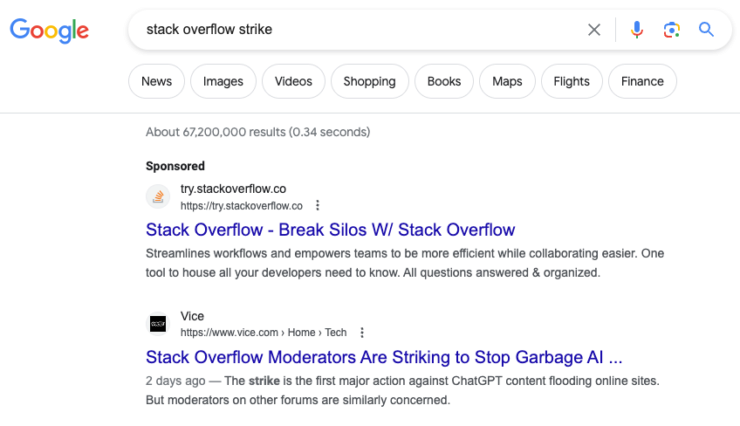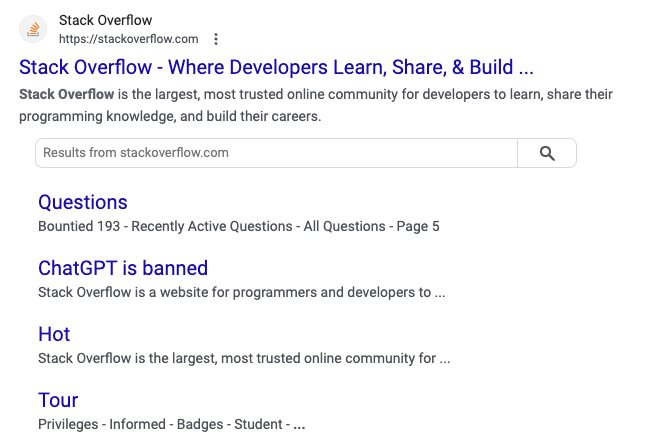How’s the Stack Overflow strike going?
We’re three days into the Stack Overflow moderator strike that I’ve written about a few times on this site:
- Stack Exchange moderator strike
- Moderation by humans
- Why I’m signing the Stack Overflow strike letter
From the perspective of executives at Stack Overflow, I suspect the spin on news sites is pretty important. They can’t be happy so far:
The first result is a paid sponsorship that I assumed was just on “stack overflow X” queries. But a few more searches prove that Stack Overflow hasn’t paid for all search results. (I’m using incognito windows, by the way, because Google likes to personalize results. Feel free to try these queries yourself!) Here’s just “stack overflow” for instance:
Not sure how much to read into the “Breaking Silos” headline. It probably isn’t supposed to remind me of strikebreakers (though it totally does). More likely there’s an unfortunate caching of a slogan from before the strike was a known possibility. The link to the temporary ChatGPT policy, the invalidation of which sparked the recent dispute, shows up because it’s been upvoted 3779 times. That makes it the highest scoring question about Stack Overflow and presumably Google’s algorithm thought the top-voted meta question would be helpful to show people searching for Stack Overflow.
More critically, the top non-Stack Overflow result is a Vice article: “Stack Overflow Moderators Are Striking to Stop Garbage AI Content From Flooding the Site”. That headline is even more pro-strike than the one the strikers themselves picked: “Moderation Strike: Stack Overflow, Inc. cannot consistently ignore, mistreat, and malign its volunteers”. Not until the second to last paragraph does the reporter present the company’s position:
Stack Overflow’s Vice President of Community, Philippe Beaudette, told Motherboard in a statement that, “A small number of moderators (11%) across the Stack Overflow network have stopped engaging in several activities, including moderating content. The primary reason for this action is dissatisfaction with our position on detection tools regarding AI-generated content. Stack Overflow ran an analysis and the ChatGPT detection tools that moderators were previously using have an alarmingly high rate of false positives.” The moderators write in their post that they were aware of the problems with the detection tool.
I should mention that I met Philippe a year or so ago. My impression is that he really does want the best for the community, but the company has put him in the difficult spot of spinning the strike as unreasonable and insignificant. Notice the Vice article contextualizes the “alarmingly high rate of false positives” claim. This isn’t a management-friendly write-up.
To pick on the “11% of moderators” claim that I’ve seen the company lean on, that number is outdated. There are 538 moderators1 right now. The open letter has been signed by 105 moderators. So the actual number is 19.5%. But that’s not the important number anyway. Moderation follows the Pareto principle in that most moderation is done by a minority of moderators. On the Stack Exchange network, Stack Overflow moderators take the crown. So the real question is how many Stack Overflow moderators have stopped moderating?
Well, 14 of the 24 active Stack Overflow moderators signed on before the strike officially started. As with the network as a whole, a minority of SO mods handle the majority of the flags. Unsurprisingly, the most active moderators signed on and by the first day of the strike the most active SO moderator was a company employee.
There’s also the problem that people besides moderators are signing the letter in support of the moderators. It’s already over a thousand signatories. The last letter topped out at 855. Now the previous dispute was a lot harder to understand outside of the Meta community. You don’t need to go into a long back story to explain that the company isn’t letting moderators block ChatGPT answers.
I was an employee during the pronoun incident. It was extremely hard to explain to people who weren’t active in the community. (My attempt a half year later doesn’t cover the half of it.) Internally, the company line was simple and closely followed the public explanation:
[She] would not use stated pronouns, which violates our current CoC.
A lot of people in the company accepted this simple statement as a complete explanation. It was a lot easier to imagine the problem was one transphobic moderator than to accept the company was slandering her. (It bears repeating the moderator isn’t transphobic and I won’t mention her name here to avoid search bots making a connection.) I’d not be surprised if to this day there are employees (and ex-employees) who think the company was fully justified in what we did.
This time around is going to be a lot harder because the story for the strike is simpler than the line the company has been pushing so far. To steel man the argument:
- GPT detectors are unreliable.
- Human intuition is prone to bias.
- Most of the suspensions for AI-generated content used those unreliable techniques and therefore are invalid.
- Some answers that have been aided by AI are useful.
- Deleting AI-assisted content and suspending people who merely look like they are using ChatGPT is causing a rapid decline in content, participation and traffic, which harms the community.
- Moderators could just apply the pre-existing quality standards and not even attempt to determine if the content was AI-generated. That will solve the problem without needing to appeal to unreliable and biased heuristics.
If this had been what the company communicated, I’m not sure we’d be talking about it right now. But the company (and particularly the CEO) have been pushing AI since April. It’s seems more likely the CEO suddenly noticed his pet project was at risk than that the company had done a careful analysis of the situation.2
It’s honestly hard to come up with a reason why a community-centric company would have any interest in machine-generated content. Back in April, College Confidential tried using ChatGPT to start conversations. When you see one example, it’s impressive. But as you see them all together, you start to spot patterns. ChatGPT loves to talk about universities’ “competitive environment” and uses almost the exact words to describe it at every school. This is the LLM variant of the Barnum effect. It gets boring quick and that’s not helpful for a community.
I find it a lot easier to see how a CEO might believe that somehow AI could be the answer to the company’s problems. Whatever the reason, the company and the community are once again telling conflicting stories. I can repeat without modification what I wrote three year ago:
There has never been a force powerful enough to eradicate a story as long as there are people willing to tell it. That cuts both ways. The company can’t compel users to accept their marketing messages and the community can’t change what the company has decided it needs to do to run its business. But both sides can start telling stories to bridge those gaps.
Maybe both are true.
I don’t know since I haven’t seen the data.I just saw that the data is now public. I haven’t had time to look at the analysis yet.↩︎

